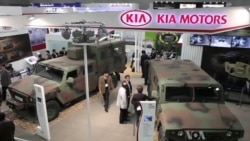SEOUL —
South Korea aspires to become a top player in the global arms industry. But some observers are concerned where those weapons are headed.
The Seoul Aerospace and Defense Expo attracts arms manufacturers from across the globe. It is also a venue for South Korean firms to showcase the latest in technology for weapons on land and in the air.
Baek Yoon-hyung is a South Korean air force pilot and spokesperson for the Defense Acquisitions Program Administration, DAPA, a government agency that oversees military imports and exports. He said South Korea targets developing economies to sell its weapons. “Basically Korea doesn’t have advanced technologies, but we have general and rigid technologies. We could share the market in certain place. We aim to expand to the niche market,” he said.
According to DAPA, South Korea’s military exports have grown 10 fold in the past decade, totaling just over $2.3 billion in 2012. And compared to other arms exporting nations, South Korea comes in 15th in terms of sales. DAPA says it wants to break into the top ten.
Ambitious newcomers in the global arms trade, like South Korea, are a concern observers at the Stockholm International Peace Research Institute, SIPRI. Senior Researcher Siemon Wezeman spoke to VOA over Skype.
“Sometimes they look for markets in slightly dodgy places, places where not everything is ok. Places where human rights are an issue, where internal tensions or tensions with neighbors are an issue,” explained Wezeman.
Wezeman said South Korea’s plans to sell military equipment to the Philippines might raise tensions with China. The two countires are locked in a territorial dispute in the East China Sea.
But analyst Kim Byung-ki of Korea University said the Philippines has a genuine need for security that South Korea can provide for. “The Filipinos have a right to have a defensive weapon to both deal with internal human trafficking, terrorists, narcotics and criminal organizations connected to the outside world, and of course to have a minimal and robust defensive capability against a great power,“ Kim stated.
DAPA’s Baek Yoon-hyung said the South Korean government recognizes these regional concerns. “When we consider opening the market, opening sales to other countries, we consider neighboring countries relationships and possible disputes. We don’t want to cause any trouble between the countries,” said Baek.
Baek said that by following those standards, South Korea hopes to land more and more weapons deals.
Producer Malte Kollenberg also contributed to this report.
The Seoul Aerospace and Defense Expo attracts arms manufacturers from across the globe. It is also a venue for South Korean firms to showcase the latest in technology for weapons on land and in the air.
Baek Yoon-hyung is a South Korean air force pilot and spokesperson for the Defense Acquisitions Program Administration, DAPA, a government agency that oversees military imports and exports. He said South Korea targets developing economies to sell its weapons. “Basically Korea doesn’t have advanced technologies, but we have general and rigid technologies. We could share the market in certain place. We aim to expand to the niche market,” he said.
According to DAPA, South Korea’s military exports have grown 10 fold in the past decade, totaling just over $2.3 billion in 2012. And compared to other arms exporting nations, South Korea comes in 15th in terms of sales. DAPA says it wants to break into the top ten.
Ambitious newcomers in the global arms trade, like South Korea, are a concern observers at the Stockholm International Peace Research Institute, SIPRI. Senior Researcher Siemon Wezeman spoke to VOA over Skype.
“Sometimes they look for markets in slightly dodgy places, places where not everything is ok. Places where human rights are an issue, where internal tensions or tensions with neighbors are an issue,” explained Wezeman.
Wezeman said South Korea’s plans to sell military equipment to the Philippines might raise tensions with China. The two countires are locked in a territorial dispute in the East China Sea.
But analyst Kim Byung-ki of Korea University said the Philippines has a genuine need for security that South Korea can provide for. “The Filipinos have a right to have a defensive weapon to both deal with internal human trafficking, terrorists, narcotics and criminal organizations connected to the outside world, and of course to have a minimal and robust defensive capability against a great power,“ Kim stated.
DAPA’s Baek Yoon-hyung said the South Korean government recognizes these regional concerns. “When we consider opening the market, opening sales to other countries, we consider neighboring countries relationships and possible disputes. We don’t want to cause any trouble between the countries,” said Baek.
Baek said that by following those standards, South Korea hopes to land more and more weapons deals.
Producer Malte Kollenberg also contributed to this report.





